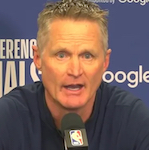 |
| Steve Kerr |
Winning a championship in any sport is incredibly difficult, yet the Golden State Warriors did it beautifully this year, through an amazing show of teamwork, structure, hard work, and character.
I am a Knicks fan so don’t get me wrong: it would be sacrilegious for me to root for Golden State. But it was difficult not to want to root for Steve Kerr and his team during this year’s run—especially after he chose to use his international media platform to take a stance on one of the most contentious social issues facing modern America today: gun control. If you haven’t yet seen the video, Kerr commented not on Steph Curry’s playing time, nor on his strategy for defeating his opponents, but rather on the need for stronger gun control laws in the wake of the horrific mass shooting in Uvalde, Texas.
It isn’t difficult to trace back Kerr’s use of his platform to someone who greatly influenced him. His stance on leadership and social good over the years mirrors one of his mentors, Gregg Popovich.
Kerr’s impassioned and emotional remarks at that press conference was one of the reasons I jumped at the chance to join a die-hard Warriors fan for game four of the NBA Finals in Boston a few weeks ago. I had never been to a Finals game, probably because the Knicks haven’t made it for decades. I accepted the invitation from my friend, Richard Strauss (of Strauss Media Strategies), who had donned a Warriors jersey for the occasion, and tried to convince me to wear one, too. I demurred, thinking all the Boston fans in green didn’t need more antagonism from me.
A great contest unfolded. After the buzzer sounded on the Warriors’ victory, only a few Warrior fans remained in the Garden. We watched from the sidelines as some of the players came out for post-game interviews.
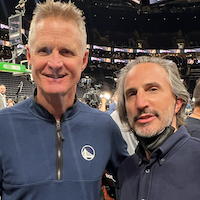 |
| Steve Kerr and Andrew Frank at the NBA Finals. |
Then Steve Kerr walked near us. I said hello casually, offering up that I agreed with his comments on social issues, particularly gun violence, and that they were in fact bigger than the game. That stopped him in his tracks and we spent a few minutes talking like long-lost friends from college. In response to his questions about my background and line of work, I mentioned my political campaign experience and work for the Clinton Administration, noting that I currently run a strategic PR firm. After leading his team to such an exciting playoff win, Kerr had no need to talk to a guy like me instead of celebrating with his team and family, but he remained truly interested and sincere during our conservation.
Post-game press conferences can serve as platforms for comments on social policy issues, sometimes shining a light for good, other times becoming greatly controversial. Look at the way the NFL has dealt with the national anthem; the recent comments by Yankees player Josh Donaldson calling a White Sox player “Jackie”; or the way the NBA dealt with the George Floyd riots while playing in the pandemic bubble.
When we think of “public relations” we think about persuasion, specifically how to persuade stakeholders to act. In terms of approaching key social issues, taking a stand is very important, especially when you hold some degree of influence. Our constitutional right is for us to all weigh in to let our elected officials know our views on the matters important to us. In the twenty-first century with constant streams of media in the palm of our hands, celebrities hold the potential to directly effectuate important change. Professional athletes and coaches in particular hold massive potential reach and influence because of their extremely loyal fans. Today there are so many issues that divide us and we must have constructive dialogue and debates to try and find common ground.
Charles Barkley famously said “I am not a role model” in a 2009 Nike commercial. Yet, he has since taken stances on police reform, racial equality, and economic justice. Because of his celebrity platform—whether he desires it or not—he has the power to initiate substantive discussion and advocate for change.
Steve Kerr is indeed a role model—a powerful voice who for two months during the playoffs held the microphone for an ever-increasing global audience. Kerr’s voice resonates—as do those of others who spoke out in agreement. While Congress and the President should continue to heed Kerr’s plea and enact further policy changes, every American should also take notice and use whatever personal platform they have to speak up for what they believe in. We need more Steve Kerrs.
***
Andrew Frank is founder and president of KARV Communications.


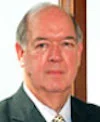 Even the most iconic sporting or ceremonial event can be deep-sixed by an overzealous member of the crowd, so crisis comms pros need to be prepared.
Even the most iconic sporting or ceremonial event can be deep-sixed by an overzealous member of the crowd, so crisis comms pros need to be prepared.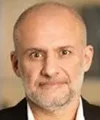 The Super Bowl, with its massive audience and sky-high ad cost, creates intense pressure to deliver. But when they hit the mark, these ads can become cultural touchstones.
The Super Bowl, with its massive audience and sky-high ad cost, creates intense pressure to deliver. But when they hit the mark, these ads can become cultural touchstones. Teneo has hired Nick Greenslade, deputy sports editor at The Times and Sunday Times, as managing director for its strategy and communications unit in London.
Teneo has hired Nick Greenslade, deputy sports editor at The Times and Sunday Times, as managing director for its strategy and communications unit in London.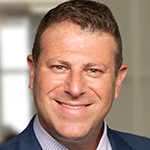 Jon Schwartz, a former SVP, communications, marketing, digital & social for the Big Ten Conference, is signing up with Prosek Partners to launch a new sports business unit.
Jon Schwartz, a former SVP, communications, marketing, digital & social for the Big Ten Conference, is signing up with Prosek Partners to launch a new sports business unit. USA Fencing has retained Finn Partners ahead of the 2024 Paris Summer Olympics and Paralympics Games.
USA Fencing has retained Finn Partners ahead of the 2024 Paris Summer Olympics and Paralympics Games.


 Have a comment? Send it to
Have a comment? Send it to 
No comments have been submitted for this story yet.